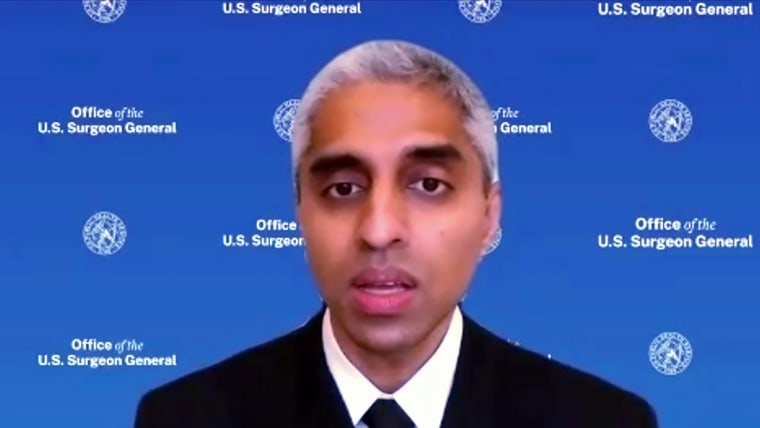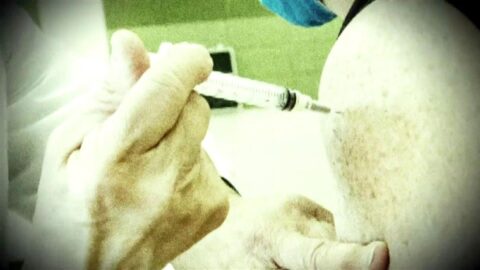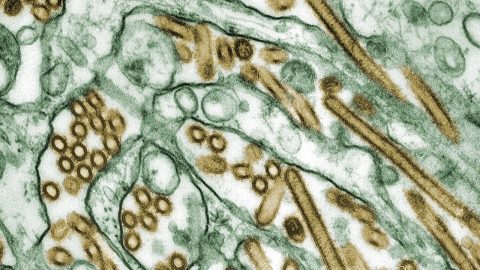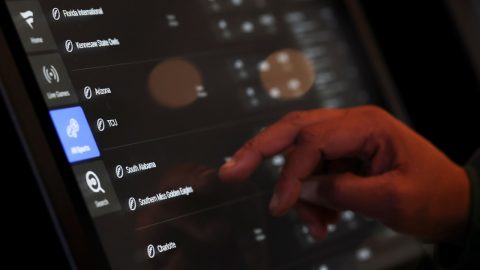Last September, Michelle Thomas thought she was about to start a new job as a therapist serving a clinic and a public school in western Wisconsin. After taking time off to raise four children, and moving states since she last worked, she was eager to restart her career.
By the first day of classes, she had a bio on the counseling clinic’s website, a list of students waiting to see her, even a child care plan for when she and her husband would both be at work. All she needed was her marriage and family therapy license.
“I’d heard stories. I knew it was going to take some time,” Thomas said. “I thought if I applied in May, by September, it would be ready to go.”
But she did not receive her Wisconsin license until November, and was only able to start seeing clients in mid-December, when the semester was nearly over.
“I live in rural Wisconsin … therapists are few and far between, and here I’m being delayed by the bureaucracy of it,” she said.
The health care system badly needs workers like Thomas, but as the pandemic wears on, they’re facing unusually long wait times for licenses in some states, preventing them from entering the workforce. The delays are putting further strain on the country’s battered health care system — already plagued by staffing shortages and increasing mental health needs — hurting not just workers’ ability to make a living, but also patients’ ability to get care.
Nationally, four different professional membership organizations said that while they were aware of delays in some states, they could not say how widespread they were. A fifth said it had not heard from any members about delays. Most referred NBC News to the association of licensing boards for their profession.
Of the four such associations contacted, two said they had heard no reports of significant delays from members and two said that while operations were at times affected by the pandemic, boards have been able to compensate for those issues. All noted that licensing boards have worked hard and been nimble in responding to the pandemic.
A group that has a national overview of licensing in a variety of professions, the Council of Licensure, Enforcement and Regulation, did not respond to questions about licensing issues during the pandemic. The council offered to “conduct some research to gain a fuller picture of what is happening at the national level,” but said “this may take some time.”
In some states, though, licensing delays and their impacts are clear. NBC News spoke to the leaders of nine health care professional organizations in three states who said wait times for licenses are worse than they’ve ever been. Licensing agencies that were already slow and understaffed were put under additional pressure by the pandemic. They’ve dealt with an influx of applicants, had to adapt antiquated paper-based application systems to remote work and built emergency licensing processes nearly overnight. In 2021 and 2022, they’ve lost staff to the Great Resignation.
That pressure created backlogs. From Wisconsin nurses to New York psychologists, health care workers said in the past year or more they’ve waited months longer than normal for approval to work. In New Jersey, some social workers have been waiting more than 18 months.
“If we don’t have efficient, consistent processing of these licensing applications, it’s just snowballing the overwhelming need,” said Deborah Baker, the American Psychological Association’s director of legal and regulatory policy. “This is more than just an administrative issue, this really is a public health issue.”
Adjustments and hiccups
The vast majority of health care professions are licensed, and each state has its own licensing process. Some have independent boards that approve licenses, others house their boards in a larger agency. Most states license dozens to hundreds of occupations, not just health care jobs. The cost and processing speed can vary greatly by state and profession.
Slow processing is often attributed to budget issues. Plenty of agencies already had staffing issues before the pandemic. Understaffed agencies processing paper applications by hand are going to be less efficient. Upgrading an agency’s system is slow, expensive and unglamorous, a process many state governments are loath to undertake. A licensing agency might see increasing applications for years while requests for extra funds for staff go ignored by legislators.
Covid-19 forced every licensing agency to adapt. Emergency rules to bring in temporary health care workers and allow a wave of new telehealth providers, along with a surge in people moving across state lines, meant an increased volume of applications and sometimes required creating a whole new emergency licensing system. At the same time, agencies were grappling with the many ways the pandemic disrupted lives, from unexpected and frequent staff absences to working remotely.
Many states had hiccups as they adjusted. In Maine, the surge in applications from out of state for temporary licenses, along with understaffing, caused significant processing delays for some mental health professions. Delays were short-lived and only affected a few professions, the agency said, and it has since added staff.
But states that still largely used manual processing systems — with applicants sending paper forms, transcripts and other records through the mail or by fax — were less nimble. For some, like Wisconsin, the crush of new emergency license applications, combined with the stressors of Covid, pushed the already beleaguered agency into crisis.
‘A skin and bone operation’
The Wisconsin state licensing agency was understaffed and overwhelmed before Covid hit. During the pandemic, it has fallen further behind on applications, struggled to upgrade to an electronic processing system and faced challenges with staff retention, as first reported by the Post-Crescent. Health care workers around the state say delays have reached a crisis level.
The licensing agency can’t say how long applications are taking because its manual record-keeping system does not calculate those figures, and doing so would take staff time away from addressing the application backlog.
“Our systems and technology are unsustainably out of date,” said Jennifer Garrett, spokesperson for the licensing agency, known as the Department of Safety and Professional Services. The department hopes to have them upgraded sometime this year, but the same staffers who process applications are upgrading the systems, reducing the number of applications they can process while they do so.
Delays have become such a concern that the Wisconsin Council on Mental Health sent two letters to the Legislature — which controls staffing levels at the agency — begging for more staffers.
“Folks are waiting just inappropriately, excessively long for their licensure. It’s desperate, at a time when we know there are severe access problems around the state,” said Dr. Richard Immler, a psychiatrist and the chair of the council.
Last year, the agency requested eight additional permanent positions and two temporary ones. The Legislature gave it the temporary staff, but only one permanent position.
That’s not enough, the agency says. Since 2015, it has seen its volume of new license applications more than double, while staff numbers stayed nearly flat. Staffing is “so extraordinarily lean” that even one worker’s illness or parental leave can vastly reduce productivity. Entry-level salaries, which start around $17 an hour, aren’t competitive in the current job market, given the type and the stress of the work. That’s led to high turnover, decreasing efficiency as the remaining staff train new people instead of processing applications.
“There is an obvious and immediate solution to this: Add necessary positions and pay market wages to attract new candidates and retain talent,” Garrett said.
The agency licenses more than 200 professions and delays affect more than just therapists, including other health care workers desperately needed in a pandemic, such as nurses and doctors.
“There were always delays, but now it’s harder,” said Dr. Sheldon Wasserman, chairperson of the Wisconsin Medical Examining Board. “It’s a skin and bone operation.”
“I get phone calls to my house, ‘Can you get my license approved?’” he said. “I’m getting applicants who track me down in the doctors’ lounges or when I walk in the hospital, ‘Hey, is there any way you can help my cousin get a license?’ I’ve never had this happen before.”
To Wasserman, the great irony is that licensing fees bring in far more money than the agency spends — it annually sends more than $1.5 million to the state’s general fund. The agency wants to use some of those funds to hire more staff and increase their pay, but decisions over both are up to the Legislature.
A bill supported by the Wisconsin Council on Mental Health could provide those things. It passed the state Senate in January, but has stalled in an Assembly committee.
‘A real crisis’
The pressures of the pandemic also caused backlogs in other states trying to upgrade the application systems at understaffed agencies. Those backlogs have had health and financial consequences for patients and workers.
In the past year, psychologists and social workers in New York have found themselves facing application waits many times longer than normal, limiting their job prospects.
Two psychologists who earned their doctorates in June said they have yet to receive permits to practice, eight months after applying — a process their supervisors said normally takes two months. Even if the permits arrive tomorrow, most postdoctoral fellowships run for a full year starting in July, leaving too little time before the next cycle for them to complete the requirements for licensure.
“It’s holding people up as far as getting jobs,” said Barbara Kapetanakes, president of the New York State Psychological Association, which has been lobbying the state on behalf of students who can’t get their paperwork due to delays. “You’ve worked so hard, you have your student loans, you have all these years of school, and then to not be able to get a job or practice … Nobody needs that added stress.”
Felix Simpson, a social worker in Albany, felt that stress last summer. Facing a much longer than expected wait for a permit to practice, Simpson went two months without income. The state licensing agency discouraged emails and had hourslong phone hold times. Eventually, Simpson contacted a state legislator for help. Just hours after speaking with someone from the senator’s office, Simpson received a permit.
“I didn’t know what I was going to do or how to pay my bills,” Simpson said. “I do firmly believe that if I hadn’t called my state senator, that delay would have been way longer.”
Any delays in application processing are a “direct result of insufficient staffing,” the New York Department of Education, which houses the licensing agency, said in a statement. While funding for the licensing agency, known as the Office of the Professions, comes from licensing fees, “over the past decade, however, the Department’s authority to spend the revenue collected has been restricted by the [state] Division of the Budget.”
That, the department said, combined with a “strict year-long Executive-imposed agency hiring freeze” during the pandemic, led the office’s staffing to drop to 15 percent below its budgeted level. It is now advocating to increase its authority over how its funds are spent “to allow sufficient staffing and implementation of new technology.”
While staffing remains insufficient, the agency has dealt with pandemic-related challenges by adopting a number of emergency rules to increase flexibility in the licensing process. Those have been successful, it said — for some professions, it has actually processed more applications during the pandemic than in prior years.
Across the Hudson, the New Jersey Chapter of the National Association of Social Workers has been fielding calls for help from desperate social workers going months without updates on their application status. The association surveyed applicants twice, and found they “struggle to determine where they are in the process and what pieces of the application may be holding them up.” Many had applied for licenses as far back as 2020.
Those licenses used to come in about three to four months, said Jennifer Thompson, executive director of the state association. “The past two years, if not two and a half, those delays have been astronomical. What we are seeing now is a real crisis.”
“We hear from different organizations — whether they be mental health or domestic violence providers — across the board that because they can’t get people who are licensed, there are wait times for services that can be three to five months,” she said.
New Jersey’s delays extend to other health care professions, including home health aides, who care for elderly and other patients in their homes. Home health aides in New Jersey must go through training and state certification.
“There were definitely waits prior to this, but this is far worse than anything we’ve ever seen,” said Steve Feinman, director of Visiting Angels Wall, NJ, a home care provider. Before the pandemic, new clients could typically start receiving care the same week, he said, “Now, the waiting period could be upwards of two to three weeks.”
The New Jersey Division of Consumer Affairs said in a statement that boards generally license applicants within a few weeks to months, a timeline consistent with other states. And while the transition to remote work “temporarily affected the issuance of applications during the early stages of the public health emergency,” staff have fully returned to the office.
The division said it has also taken steps to improve application processing, including hiring additional staff and adding a call center. They’re already paying off, a spokesperson said. In 2021, the New Jersey Board of Social Work Examiners issued more licenses than in any previous year.
When the emergency ends
The waning of the pandemic won’t necessarily mean the end of bottlenecks. In New Hampshire, hundreds of nurses who received conditional licenses during the governor’s state of emergency found themselves scrambling when it ended last June. For their licenses to remain valid, they needed to quickly complete a criminal background check. As in other states, there were staffing challenges at both the licensing agency and the Department of Safety, which conducts background checks for licenses, and applications began to back up.
By December, there were more than 700 pending nurse license applications, many stalled by the background check process. Staff from the licensing agency were helping process background checks. The backlog and the critical need for nurses led Governor Chris Sununu to step in. He issued an executive order giving the nursing board power to make an emergency change to its requirements. Soon, nurses whose applications were complete, pending their background check, could begin working once their fingerprint appointment was scheduled. Within weeks, most of the applicants received their licenses, according to the state nursing association.
While it now “appears resolved,” according to the licensing agency, the background check backlog raised questions about how to speed the state’s licensing process to get nurses into the workforce quicker.
New Hampshire has typically been slow at processing nurse licenses, said Pamela DiNapoli, executive director of the New Hampshire Nurses Association, but the shortage has added pressure to move faster. “It takes a long time to get [nurses] into the system, which just amplifies the shortage in the short run,” she said. “There’s still work to be done to address turnaround time.”
The Office of Professional Licensure and Certification processes nursing applications in two to three business days, Executive Director Lindsey Courtney said, but “the issue … is that the large majority of applications received are missing required documentation.”
The state has taken steps to reduce the number of incomplete applications, she said, including updating the office’s website with clearer information on requirements and upgrading the background check system.
Nursing organizations in other states, like Hawaii and Oregon, worry they could see a sudden licensing backlog like New Hampshire experienced. Both states have a host of nurses working with licenses issued under emergency pandemic rules. Those licenses are set to expire when the states of emergency end, and those nurses will need to apply for regular licenses. Concerned their licensing agencies could be overwhelmed, employers in both states are urging nurses to apply before that happens.
In a December report on the state’s nursing supply, the Hawaii State Center for Nursing warned that such a backlog could exacerbate what is already a statewide nursing crisis.
But delays can be prevented, the report said. Just increase staffing at the licensing agency.










Recent Comments